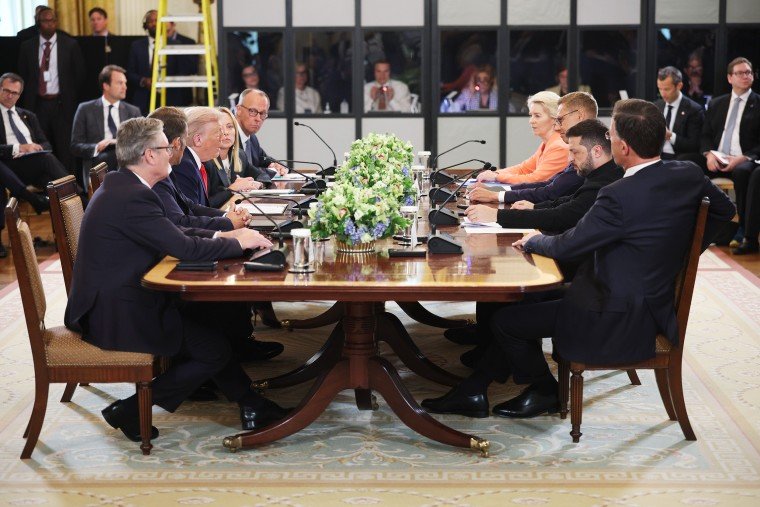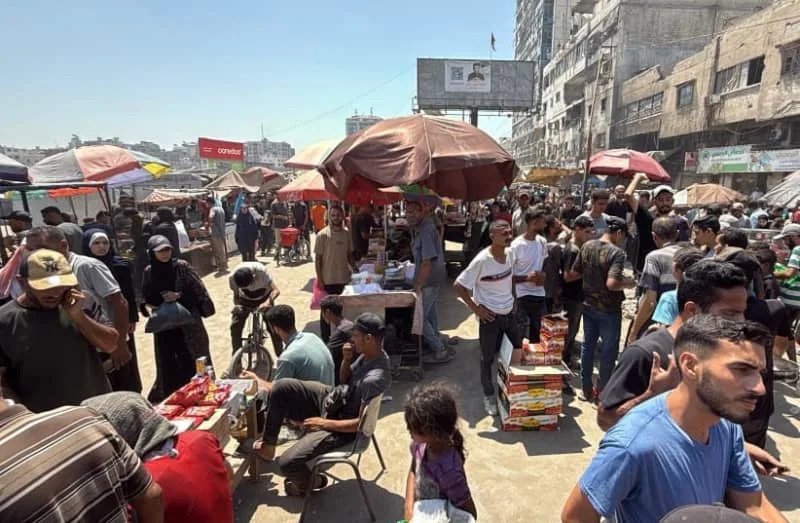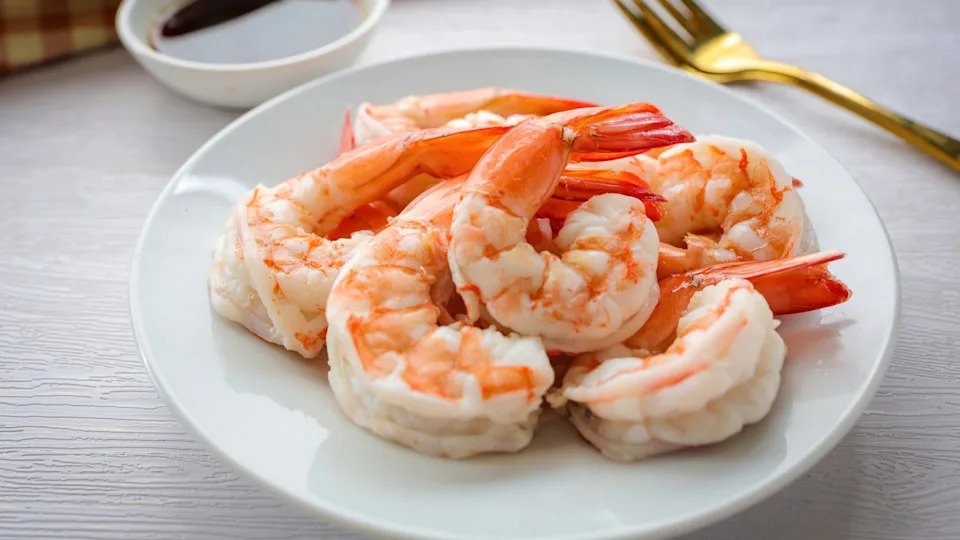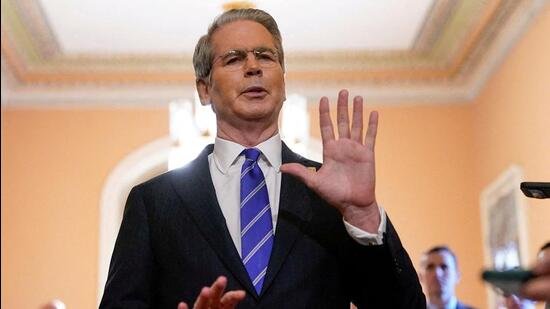Vladimir Putin and his Russian delegation may have been welcomed on United States soil, but sanctions meant that when it came time to pay for the refuelling of their aircraft, they offered to pay in cash.
Speaking about the summit and the current state of negotiations, US Secretary of State Marco Rubio defended Donald Trump’s decision to not impose further sanctions on Russia despite Mr Putin not agreeing to a ceasefire.
“Every single sanction that was in place on the day he took over remains and the impact of all those sanctions remains,” Mr Rubio told NBC.
“When the Russians landed in Alaska … they had to offer to pay in cash to refuel their airplanes because they can’t use our banking system.
“They face consequences every single day, but the bottom line is that has not altered the direction of this war. That doesn’t mean those sanctions were inappropriate, it means it hasn’t altered the outcome of it.”
Mr Putin and his team were on the ground in Alaska for about five hours on Friday, and departed shortly after a joint press conference between the Russian president and Mr Trump.
Secretary of State Marco Rubio says he believes Russia is still feeling pressure over the current sanctions imposed by the United States. (Reuters: Kevin Lamarque)
The US president said “no deal” was done, but yesterday it was revealed that there is an offer from Russia on the table and some reporting suggested Mr Trump was leaning on Ukraine to consider it.
Ukrainian President Volodymyr Zelenskyy will be in Washington on Monday, local time, to have his own meeting with Mr Trump.
Mr Zelenskyy and European leaders have pressed the United States to consider further sanctions on Russia, but today Mr Rubio said that was not the current strategy.
“Those options remain to the president. The minute he takes those steps, all talks stop. The minute we take those steps, there is no-one left in the world to go talk to the Russians and try and get them to the table to reach a peace agreement,” he said.
“We may very well end up in that place. I hope not because that means that peace talks failed.”
Speaking to the Sunday morning political programs in the United States, Mr Rubio and special envoy Steve Witkoff were repeatedly asked what concessions Russia might be willing to make without the threat of new sanctions.
Both men were beside Mr Trump as he met with Mr Putin on Friday as part of the three-on-three discussion. And today, both suggested there would have to be compromise on both sides.
“We all the know the elements of such a deal: there has to be talk about what the territories are going to look like … there has to be talk about Ukraine’s legitimate desire for security in the long term, to make sure they don’t get invaded again, there has to be talk about how Ukraine is rebuilt,” Mr Rubio told NBC.
“If there is going to be a deal, each side is going to have to give up on something.”
What concessions are Russia considering?
The current state of negotiations suggest the most significant area of compromise right now is around security guarantees, and how Ukraine deters Russia after any peace agreement is signed.
Mr Witkoff, who has also travelled to Moscow several times to discuss its war in Ukraine, said it was now possible that the US could provide a NATO-like guarantee for Ukraine.
“We were able to win the following concession, that the United States could offer Article 5-like protection … which was the first time we had ever heard the Russians agree to that,” Mr Witkoff told CNN.
Mr Witkoff was referring to Article 5 of the North Atlantic Treaty, which regards any attack against one of its 32 members as an attack on all.
He suggested the US would play that role instead and work as a security guarantee offered to Ukraine in lieu of NATO membership, which Mr Putin has ruled out.
He said the American delegation in Alaska did not think they “were anywhere close” to achieving that in the meeting with Russia.
Mr Witkoff characterised it as a “concession”.
He said as well as the NATO-like guarantee, Russia also agreed to “legislative enshrinement in the Russian Federation” to not invade Ukraine again or other European nations.
It is worth noting that in 2022, eight months after Russia launched its invasion, its parliament rubber-stamped legislation to designate four regions of Ukraine as Russia under its constitution. In that sense, it does not consider those regions a different nation.
In a meeting of European leaders and Mr Zelenskyy on Sunday, local time, security guarantees were discussed, with European Commission President Ursula von der Leyen saying, “Ukraine must become a steel porcupine, indigestible for potential invaders.”
‘The crux of the deal’
Giving further insight into the status of the negotiations with Russia, Mr Witkoff said the “crux of the deal” at this point, was where territory lines could be drawn.
There is no appetite from Ukraine for its borders to be redrawn and its territory to be ceded to Russia, but Mr Witkoff said this would be a focus of the discussions in the White House tomorrow.
Special envoy Steve Witkoff has travelled to Russia several times this year to try to strike a deal over Ukraine. (Reuters: Sputnik/Gavriil Grigorov)
He gave some insight into where that conversation may begin.
“The fundamental issue, which is some sort of land swap, which is obviously ultimately in the control of the Ukrainians, that could not have been discussed at that meeting. We intend to discuss it on Monday,” he said.
There has been reporting in the United States that Mr Trump is encouraging Mr Zelenskyy to strike a deal with Russia that would see his nation lose some, if not all, of the Donbass.
Mr Witkoff said that was “the crux of the deal”.
“There are five regions, [that have] always in our view has been the crux of the deal. Those five regions the Russians have previously said they wanted it at the administrative lines. The administrative lines are the actual legal boundary lines as compared to the contact lines,” he said.
“The Russians made some concessions at the table with regard to all five of those regions.
“There is an important discussion to be had with regard to Donetsk and what would happen there and that discussion is going to specifically be detailed on Monday [local time] when president Zelenskyy arrives with his delegation and other European leaders.”
It is likely the regions he is referring to are Donetsk, Luhansk, Kherson, Zaporizhzhia and Crimea.
After his meeting with European leaders on Sunday, local time, Mr Zelenskyy said: “Everyone agrees that the borders of states should not be changed by force.”
“Everyone supports that key issues should be resolved with the participation of Ukraine in a trilateral format: Ukraine, the United States, the Russian leader.”
Mr Witkoff said it was his view that the negotiations would get to a point where the three leaders, Mr Trump, Mr Zelenskyy and Mr Putin could meet.
There has been no indication from Mr Putin that he has changed his position on that.
ABC








